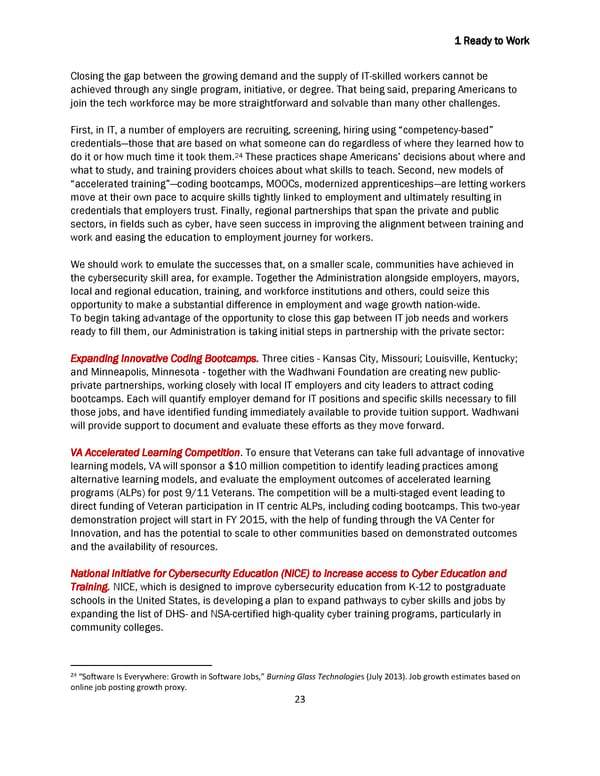1 Ready to Work Closing the gap between the growing demand and the supply of IT-skilled workers cannot be achieved through any single program, initiative, or degree. That being said, preparing Americans to join the tech workforce may be more straightforward and solvable than many other challenges. First, in IT, a number of employers are recruiting, screening, hiring using “competency-based” credentials—those that are based on what someone can do regardless of where they learned how to do it or how much time it took them.24 These practices shape Americans’ decisions about where and what to study, and training providers choices about what skills to teach. Second, new models of “accelerated training”—coding bootcamps, MOOCs, modernized apprenticeships—are letting workers move at their own pace to acquire skills tightly linked to employment and ultimately resulting in credentials that employers trust. Finally, regional partnerships that span the private and public sectors, in fields such as cyber, have seen success in improving the alignment between training and work and easing the education to employment journey for workers. We should work to emulate the successes that, on a smaller scale, communities have achieved in the cybersecurity skill area, for example. Together the Administration alongside employers, mayors, local and regional education, training, and workforce institutions and others, could seize this opportunity to make a substantial difference in employment and wage growth nation-wide. To begin taking advantage of the opportunity to close this gap between IT job needs and workers ready to fill them, our Administration is taking initial steps in partnership with the private sector: Expanding Innovative Coding Bootcamps. Three cities - Kansas City, Missouri; Louisville, Kentucky; and Minneapolis, Minnesota - together with the Wadhwani Foundation are creating new public- private partnerships, working closely with local IT employers and city leaders to attract coding bootcamps. Each will quantify employer demand for IT positions and specific skills necessary to fill those jobs, and have identified funding immediately available to provide tuition support. Wadhwani will provide support to document and evaluate these efforts as they move forward. VA Accelerated Learning Competition. To ensure that Veterans can take full advantage of innovative learning models, VA will sponsor a $10 million competition to identify leading practices among alternative learning models, and evaluate the employment outcomes of accelerated learning programs (ALPs) for post 9/11 Veterans. The competition will be a multi-staged event leading to direct funding of Veteran participation in IT centric ALPs, including coding bootcamps. This two-year demonstration project will start in FY 2015, with the help of funding through the VA Center for Innovation, and has the potential to scale to other communities based on demonstrated outcomes and the availability of resources. National Initiative for Cybersecurity Education (NICE) to increase access to Cyber Education and Training. NICE, which is designed to improve cybersecurity education from K-12 to postgraduate schools in the United States, is developing a plan to expand pathways to cyber skills and jobs by expanding the list of DHS- and NSA-certified high-quality cyber training programs, particularly in community colleges. 24 “Software Is Everywhere: Growth in Software Jobs,” Burning Glass Technologies (July 2013). Job growth estimates based on online job posting growth proxy. 23
 Biden Ready to Work White Paper 7/22/14 Page 22 Page 24
Biden Ready to Work White Paper 7/22/14 Page 22 Page 24